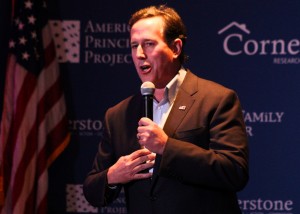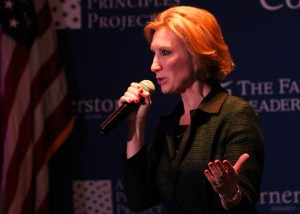Cruz, Santorum, Fiorina pitch plans to limit government
By Evan Lips | October 3, 2015, 21:37 EDT
 Former Hewlett-Packard chief Carly FIorina, seen here at a forum in New Hampshire in October, won’t be on the main card for Thursday’s Republican presidential debate. (New Boston Post file photo by Evan Lips)
Former Hewlett-Packard chief Carly FIorina, seen here at a forum in New Hampshire in October, won’t be on the main card for Thursday’s Republican presidential debate. (New Boston Post file photo by Evan Lips) HOOKSETT, N.H. — A trio of Republican presidential hopefuls made appearances at Southern New Hampshire State University on Saturday to speak at an event touting efforts to weaken the federal government’s influence, a theme all three candidates unabashedly support.
Texas Sen. Ted Cruz, former Hewlett-Packard chief Carly Fiorina and former Pennsylvania Sen. Rick Santorum each took similar jabs at the current administration but each also painted a different picture as to how they would lead from the White House.
Cruz whipped up the crowded college conference hall, packed with more than 250 guests, and drew cheers and laughs as he cracked jokes about abolishing the Internal Revenue Service and transferring its 90,0000 employees to the southern border to contain illegal immigration.
“If the first thing you see after swimming across the Rio Grande is 90,000 IRS agents, you’d turn around and go,” Cruz said.
The Texan may have been joking about relocating and repurposing IRS workers but he stressed that he is serious about enacting a flat tax and thus making the agency unnecessary so it could be shut down. The senator hasn’t specified the flat rate he would like to impose.
Cruz also said he’s committed to taking on the “establishment” in Washington, an oft-repeated campaign promise but also one he’s lived up to, taking on Republican leaders in the Senate over issues such as using taxpayer money to fund Planned Parenthood. Yet his efforts to block all government funding to force the removal of support for the nonprofit organization fell flat, even among the GOP rank-and-file in the chamber.
At the Federalist forum, Cruz spoke first as each candidate received about 30 minutes to give a speech and then taking on a few pre-selected written questions from the audience. Fiorina followed and Santorum came last.
The former Pennsylvania senator made clear that while he supports conservative philosophies, his approach to leadership largely avoids the firebrand style employed by Cruz. Recalling his 12 years in the Capitol’s upper chamber, Santorum spoke at length about his willingness to work with Democrats across the aisle.
“I know the word ‘compromise’ is viewed as a dirty word in a lot of people’s minds,” Santorum said as he recalled tackling welfare reform in the late 1990s. At the time, Republicans controlled the Senate and the House of Representatives, as they do today. Working with then-President Bill Clinton, a Democrat, lawmakers managed to reduce poverty to historic lows.
“I would argue the most successful conservative reform since Ronald Reagan was accomplished with a Democratic president and a Republican Congress,” Santorum said. He said that today’s climate makes the same sort of collaboration more difficult.
“One of the problems we have in Washington these days is we have people personally attacking each other,” the Pennsylvanian said. “When you do that, you destroy any possibility of people working together.”
As the only candidate present who hasn’t worked in government previously but who led a company that did business with official Washington regularly, Fiorina attacked what she referred to as “crony capitalism.” She said evidence of this insider’s game could be seen in everything from negotiations for the Affordable Care Act, or “Obamacare,” as she termed it, to the 73,000-page U.S. tax code.
“When government gets that big and powerful what happens is that only the wealthy and the well-connected can handle it,” Fiorina said. Those who engage in this, she said, are “using the complexities of government to feather their own nests and advance their own purposes.”
Fiorina also pointed to the use of eminent domain as an example of crony capitalism at work and took a shot at GOP rival Donald Trump, a New York developer, over the way he built a casino business in Atlantic City, New Jersey.
“There was a woman named Vera Coking in Atlantic City whose home was almost destroyed so that Trump’s casinos could build a parking lot for limousines,” Fiorina said, referring to attempts in 1993 to displace Coking, a city resident, which was ultimately unsuccessful. “Big business and big government get together.”
The people that are getting “crushed” by the current system are the ones starting and running small businesses, Fiorina said. She also talked about how people today are “getting wrapped up in waves of government dependence.”
Fiorina drew cheers when she criticised the federal government’s expansion and its effects. She faulted current spending levels, asking rhetorically, “Why is it that the government spends more money each and every year yet never has enough to do its duty?”
Fiorina then proposed an approach that may help rein in spending.
“We need to go to some version of zero-based budgeting, so we know where every single dollar is being spent,” she said.
Fiorina also proposed an idea she said would get lawmakers’ attention. If elected president, Fiorina said she’d use her weekly radio address as a way to pose questions to Americans and give them an easy way to respond. For instance, she said she might ask whether the public wants to know where every dollar of the federal budget is being spent and let listeners respond by telephone, dialing in and pressing one on the keypad for “yes” or two for “no.”
“Congress will feel the pressure,” she said.
The American Principles Project, which hosted the event, is a Washington-based nonprofit organization which “believes that local and national policies that respect the dignity of the person will lead to a flourishing society,” according to its mission statement.
“This event was an incredible opportunity to engage and empower citizens in New Hampshire and across the nation,” said Emmett McGroarty, the organization’s education director, said in a statement. McGroarty said his group “looks forward to continuing to work in New Hampshire leading up to the primary next year as we raise the consciousness of legislators, activists and all of the presidential candidates on the reality of federal overreach and the importance of limited government.”
Following their separate speaking appearances, each candidate the American Principles Project asked each candidate to define “practical federalism.”
Here are their answers:
Cruz – “It is the genius of the Constitution, it is the genius of the 10th Amendment, that the states serve as Supreme Court Justice Louis Brandeis put it as laboratories of democracy, that the Constitution defines the powers of Congress in Article I, Section 8 that they are few and enumerated and everything that is not in there is left to the States to decide. I’ve spent a lifetime fighting and defending the Constitution, we need to get back to the Constitution, and as President that’s exactly what I’m going to do.”
Fiorina – ““I think Practical Federalism is the recognition that our nation was founded on a set of incredibly profound, but incredibly practical principles. We need to remember who we are now. We need to remember who we are. And who we are is laid out for us. It curtails the abuse of power by government, and it lifts up the rights of individuals to pursue their God given gifts.”
Santorum – “Practical Federalism is locating the solution to the problems at the area most appropriate for those solutions to maximize the benefit for individuals in society. And the idea that, if you can handle a problem at an individual, family, community level, that’s where we should put the burden. If it’s too big of a problem for that area, then move it up to a local government and then a state government – it’s only when a problem becomes overwhelming that the federal government needs to weigh in. That’s the principle that Jefferson espoused, and if we go back to those principles and we look at areas where federal government inserting itself – like welfare – has actually done real damage to the structure that was most designed to help people, which was the family. Then, we can begin to repair the family unit by exiting the government – particularly the federal government – out of that equation.”
Contact Evan Lips at [email protected] or @evanmlips on Twitter.














